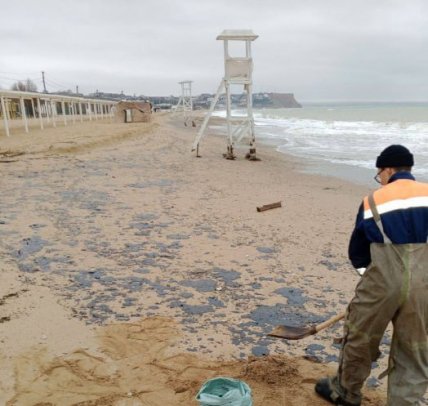Crimea is facing an oil disaster from Russia. A state of emergency has already been declared in Sevastopol (photos available).
In the temporarily occupied Crimea, fuel oil continues to pollute the coastline, prompting the declaration of a state of emergency (SE) in Sevastopol. Following the December accident involving Russian oil tankers, pollution was detected on the beaches of Lyubimovka and Orlovka, located west of Sevastopol.
This was reported by "Crimean Wind". It is noted that pollution in Crimea has been recorded for several weeks, as on January 2 two areas of contamination with petroleum products were found: near the Kerch beach and close to Lake Tobečik.
"Fuel oil has already reached the beaches of Lyubimovka and Orlovka, which are on the western coast of Sevastopol," the report states.
 1
1 A state of emergency has been declared in Sevastopol due to the appearance of fuel oil patches on the beaches following the tanker accident in the Kerch Strait. According to the Crimean Hydrometeorology and Environmental Monitoring Office, a strengthening of the southwest wind to 17-22 m/s is expected in Crimea on January 4. This may accelerate the influx of fuel oil to the coast.
 2
2  3
3  4
4  5
5 At the same time, according to the Russian Ministry of Emergency Situations, more than 86,000 tons of contaminated soil have been collected in Kuban and Crimea.
"More than 715 square kilometers of the water area have been surveyed in the Kerch Strait. A total of 25 tons of oil-water mixture have been collected. In Crimea, 15 kilometers of the coastline are being cleaned, including two newly discovered areas of fuel oil discharge," the report adds.
In particular, there is a contaminated section over 2 kilometers long near the village of Yakovenkovo close to the Kyz-Aul lighthouse, and over 4 kilometers in the area of the "Opuk" nature reserve.
Previously, "Telegraph" reported where the oil slick in the Black Sea might drift and which reserves are at risk.